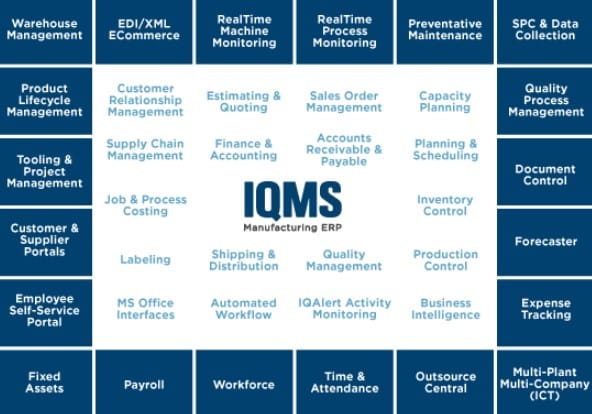In the dynamic landscape of manufacturing, efficiency is paramount. IQMS ERP, an abbreviation for Enterprise Resource Planning, emerges as a pivotal solution to streamline and enhance manufacturing processes. Let’s delve into the definition, historical evolution, key features, benefits, challenges, successful implementations, future trends, and insights on selecting the right IQMS ERP system.
Evolution of IQMS ERP

Manufacturing has faced multifaceted challenges throughout history, from production inefficiencies to supply chain complexities. The integration of IQMS ERP into manufacturing processes signifies a transformative shift, addressing historical challenges and providing an integrated solution for manufacturing excellence.
Key Features of IQMS ERP
Real-time Data Tracking
IQMS ERP empowers manufacturing units with real-time data tracking capabilities. This feature allows for instant insights into production processes, enabling better decision-making and resource optimization.
Shop Floor Control
Efficient shop floor control is a cornerstone of IQMS ERP. The system provides tools to monitor and manage production activities on the shop floor, ensuring a streamlined and organized manufacturing process.
Supply Chain Management
IQMS ERP excels in supply chain management, offering end-to-end visibility into the supply chain. From procurement to production and delivery, the system ensures seamless coordination, reducing bottlenecks and enhancing overall efficiency.
Benefits of Implementing IQMS ERP
Improved Production Efficiency
IQMS ERP significantly improves production efficiency by optimizing workflows and reducing downtime. Real-time data insights enable quick decision-making, ensuring a smooth and efficient manufacturing process.
Enhanced Quality Control
Quality control is paramount in manufacturing. IQMS ERP integrates robust quality control features, ensuring that every product meets the highest standards, reducing defects and enhancing customer satisfaction.
Streamlined Inventory Management
Managing inventory efficiently is a challenge for many manufacturers. IQMS ERP streamlines inventory management, providing real-time insights into stock levels, reducing holding costs, and preventing shortages.
Challenges in Implementing IQMS ERP
Customization Complexity
While IQMS ERP offers a range of features, customization can be complex. Tailoring the system to specific manufacturing processes requires careful planning and expertise to ensure a seamless fit.
Staff Training
The successful implementation of IQMS ERP hinges on effective staff training. The learning curve can be steep, emphasizing the need for comprehensive training programs to ensure all users can maximize the system’s potential.
Integration with Existing Systems
IQMS ERP integration with existing systems can present challenges. Ensuring compatibility and a smooth transition is vital for minimizing disruptions in manufacturing operations.
Case Studies: Successful IQMS ERP Implementations
Manufacturing Company A: Boosting Production Output
By implementing IQMS ERP, Manufacturing Company A increased its production output by 25%. The system’s real-time tracking and streamlined processes contributed to this significant improvement.
Company B: Achieving Lean Manufacturing
Company B adopted IQMS ERP and successfully transitioned to a lean manufacturing model. The system’s shop floor control and supply chain management capabilities played a pivotal role in this transformation.
Future Trends in IQMS ERP
Integration of IoT and AI
The future of IQMS ERP involves seamless integration with the Internet of Things (IoT) and Artificial Intelligence (AI). This integration will further enhance automation, predictive analytics, and decision-making capabilities.
Cloud-Based Manufacturing Solutions
Cloud-based IQMS ERP solutions are gaining traction, offering manufacturers flexibility, scalability, and accessibility. Cloud deployment facilitates remote operations and ensures real-time collaboration among dispersed teams.
Selecting the Right IQMS ERP System
Scalability
Choosing a scalable IQMS ERP system is crucial for accommodating the evolving needs of manufacturing. The system should seamlessly adapt to changes in production volumes and business growth.
Industry-Specific Modules
IQMS ERP offers industry-specific modules tailored to the unique needs of various manufacturing sectors. Selecting a system with relevant modules ensures that it aligns with specific industry requirements.
Realizing the Full Potential of IQMS ERP
Continuous Improvement Strategies
IQMS ERP is not a one-time solution but a continuous improvement journey. Manufacturers should implement strategies for ongoing improvement, gathering user feedback, and staying updated on system advancements.
User Feedback and Adaptation
Listening to user feedback is essential for adapting IQMS ERP to the evolving needs of manufacturing units. Regular updates and adaptations based on user experiences ensure that the system continues to meet and exceed expectations.
Conclusion
In conclusion, IQMS ERP is more than a tool; it’s a catalyst for manufacturing excellence. Its impact on production efficiency, quality control, and supply chain management is transformative. As manufacturing enterprises navigate the complexities of the modern industry, embracing IQMS ERP becomes not just a choice but a strategic investment in the future of manufacturing.
[adinserter block=”1″]